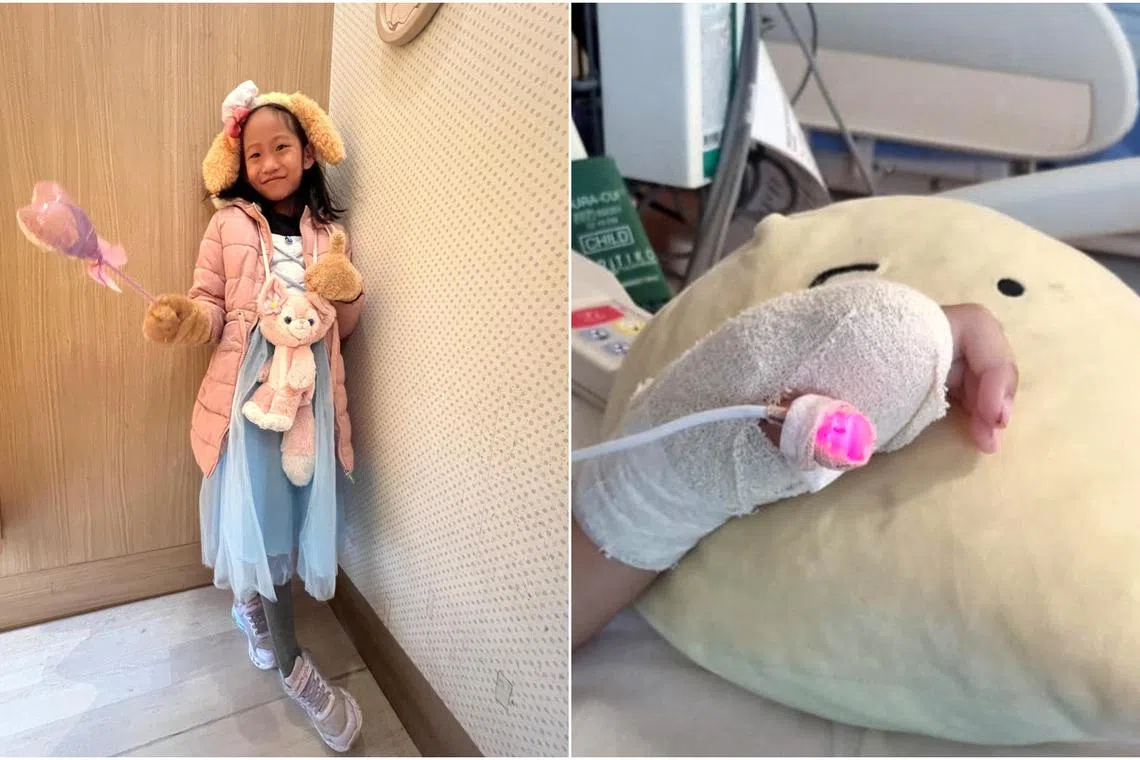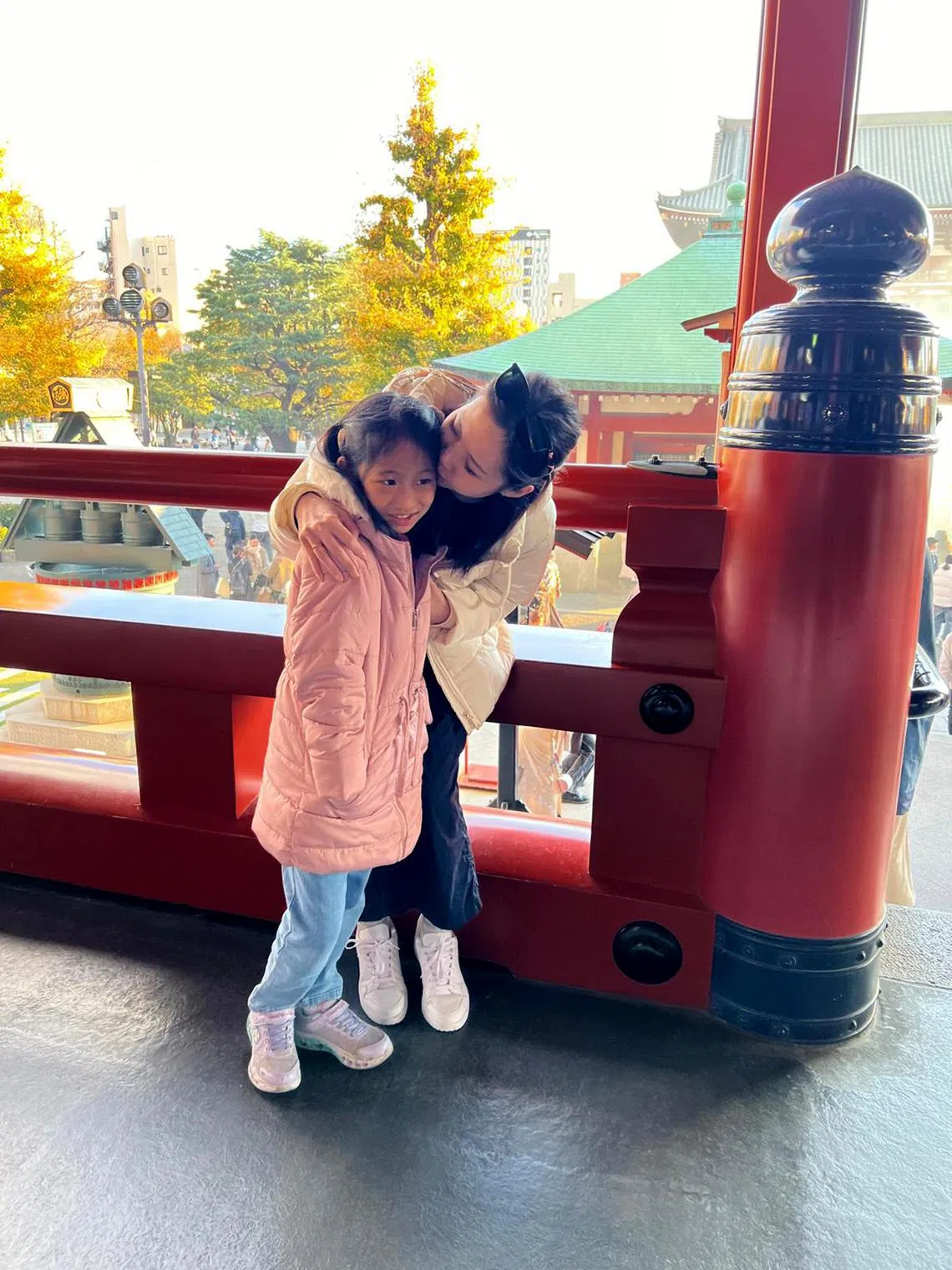‘Glad we can move on’: Girl who lost finger in Ion Orchard toilet hand dryer gets $170k in damages
Sign up now: Get ST's newsletters delivered to your inbox

In 2021, Kara Chia's index finger was severed (right) after she placed her hand in a hand dryer of a toilet at Ion Orchard.
PHOTOS: COURTESY OF NICK CHIA, NICK MATTHEW CHIA/FACEBOOK
Follow topic:
SINGAPORE – It was a Monday evening in December 2021 when the Chia family was out for dinner at Ion Orchard.
Mr Nick Chia heard screaming from the mall’s toilet that his three daughters and helper were in and knew something was wrong.
He did not imagine that his five-year-old daughter Kara would place her hand in the toilet’s hand dryer, and have her finger mangled within seconds.
The fan blades of the dryer, which was missing a vent cover, severed the girl’s finger and shattered the bones.
She lost more than half of her left index finger and was left with a stump after amputation.
In November 2024, the family found some closure after their case was concluded in court.
They received compensation of $170,000 in damages and $39,507 in legal costs from Ion Orchard and its insurers.
Through lawyers Raj Singh Shergill and Desiree Koh of Lee Shergill, the girl’s father had sought compensation for pain and suffering, medical and caregiving expenses, and cost of future treatment, including prosthetic fittings which need replacing every few years.
Lawyer Christopher Fernandez of TKQP represented the defendants.

Kara Chia with her mother in Tokyo in December 2024.
PHOTO: COURTESY OF NICK CHIA
The out-of-court settlement for the negligence lawsuit was reached through a full-day mediation between the parties in September 2024. The court’s approval was required for the settlement because the plaintiff is a minor.
Mr Shergill waived an additional amount, known as an “uplift”, on the legal fees typically charged by law firms so the family could retain their damages in full.
Speaking to The Straits Times, Mr Chia said: “What I feel about the whole thing, in a nutshell, is really relief. I’m glad that we can move on.
“It’s more a case of getting a little bit of justice for Kara, and whatever the amount was, it’s secondary.
“It’s not a situation I would wish for any parents to be in, nor anyone.”
Mr Chia expressed gratitude to Mr Shergill: “Having him advise us and be by our side throughout the whole thing was really, really helpful, because he knew, from his experience, what were the realistic outcomes for this situation.
“I also have to commend the insurer and Ion for ultimately doing what’s right and not repeating everything and dragging this to court, because it will just lengthen the entire process.”
Responding to queries, an Ion Orchard spokesperson told ST: “We are unable to comment further on this matter. We have extended all necessary assistance to the child and her family.
“The safety and well-being of our patrons remain our highest priority, and we are committed to ensuring a safe environment for all.”
Kara, now eight, has spent much of the past three years in her doctor’s, psychologist’s and occupational therapist’s offices. She now uses a prosthetic finger.

More than half of Kara’s index finger was severed (left) by the fan blades of a hand dryer (right).
PHOTOS: NICK MATTHEW CHIA/FACEBOOK
According to the affidavit, in the months after the incident, Kara was often jolted awake by recurrent nightmares and could not go to sleep on her own.
A psychologist diagnosed her with post-traumatic stress disorder.
She frequently retold the sequence of events that led to the accident, at bedtime and whenever she saw an ambulance on the road.
She also re-enacted the incident in a game with her best friend, with the objective of not letting her fingers get stuck, according to court documents.
While Kara has healed physically, she still feels some lingering pain on the stump, said Mr Chia, 38, who works in sales in the automotive industry. His wife is a homemaker.
Kara also has some trouble buttoning her blouse, tying her hair, using cutlery and typing.
A confident social butterfly before the accident, she is now more reserved and sticks to a few trusted friends in school.
Mr Chia recounted how one classmate would not hold Kara’s hand when lining up for school activities as she was afraid of hurting Kara.
“There’s a lot of residual mental torture, because you never know what might trigger her thoughts back to this,” he said.

Kara (in pink) and her family in Tokyo in December 2024.
PHOTO: COURTESY OF NICK CHIA
In another instance, Kara held and admired her three-year-old sister’s hand, saying: “Mei mei’s (little sister) hand is so pretty, right?”
Kara is the fourth of six children – four girls and two boys – ranging from 10 months to 12 years old.
The Primary 3 girl also lovingly reminds her younger siblings to be careful of hidden dangers in hand dryers and other machines, although sometimes she would fall silent after that, said Mr Chia.
“She’s just trying to manage her emotions. She’s a very sensible girl, and she would try not to do things that would have people go out of their way for her, even bottling it up.”
He and his wife encourage her to talk to them about the incident, and tell her it is okay to cry.
For the most part, life has returned to normal for the family.
The school she attends, CHIJ St Nicholas Girls’ School, has helped Kara to fit in and keep her safe, said Mr Chia.
She is learning to play the recorder in school, and is keen to join the guzheng, choir or Chinese dance co-curricular activity. Anticipating some difficulty with the instruments, the school is helping her find modified ways of playing.
Other children are curious about what happened, and wince in pain when she recounts the incident, but otherwise pay her hand little attention, said Mr Chia.
At home, her parents treat her no differently from their other children, giving her the same dressing down when she refuses to do her homework, for instance.
“We are very conscious that special treatment will be very detrimental to the relationship between her and her siblings, and eventually the siblings and us,” said Mr Chia.
What he wants is for his daughter to do what makes her happy.
“Every parent hopes for their kid to be a high-flier. But, ultimately, especially after something like that, I just want Kara to be happy and strong wherever she is.”
Asked what she has learnt from the entire ordeal, Kara quietly said: “Bravery.”
To other children who have experienced such trauma, she has this to say: “Don’t give up; it will get better.”
Shermaine Ang is a journalist at The Straits Times, covering social issues in Singapore.


